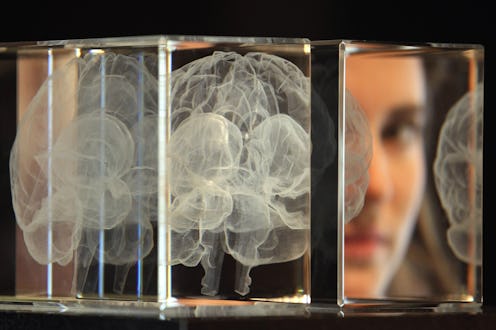
With the recent FDA approval of the nasal spray esketamine (an antidepressant based on the anesthetic ketamine) as a treatment for depression, there's been a lot of discussion about this potential miracle drug. While there is evidence of its benefits, how ketamine works to treat major depression has not been widely understood until now. New research published in Science reported that ketamine works in the brain for treatment-resistant depression by reversing prefrontal cortical synapse loss in the brain.
Depression-related synapse loss is reportedly stress related, and a study on mice found that ketamine restored the synapses that were lost as a result of exposure to chronic stress. Even though the study showed significant synapse repair, the effects were temporary, which is why the effects of ketamine as an antidepressant wear off. "What we can imagine is that ketamine always has this short-term antidepressant effect, but then if the synaptic changes are not maintained, you will have relapse," Neuroscientist Anna Beyeler told NPR.
In addition, the study in Science also emphasized that ketamine is not a one-and-done solution. "Sustaining remission after ketamine treatment is a particular challenge. Antidepressant effects of a single dose of ketamine eventually dissipate, and the long-term safety and efficacy of repeated dosing are not well understood." Until recently, ketamine was mostly used as anesthetic during human and animal surgeries. It's also known by the street name special K (a party drug) and has potential for misuse. This is why people being treated with ketamine and esketamine must be supervised and monitored by medical professionals.
While successful treatments for major depression are still largely a mystery, this research is an important breakthrough in understanding how ketamine works to relieve symptoms of depression. An article on the Yale Medicine website noted that ketamine has been studied for almost two decades in controlled settings as a potential treatment for depression. The results were promising in patients who had not responded to other medications and many showed significant improvement within 24 hours.
Dr. Gerard Sanacora, a psychiatrist at Yale Medicine who was involved in many ketamine studies, said ketamine "appears to help facilitate the creation new neural pathways that can help them develop resiliency and protect against the return of the depression." He added that patients can build additional resilience by augmenting treatment with cognitive behavioral therapy.
Because it's still not clear how to sustain these new neural pathways, patients need regular treatments to avoid relapse. This type of ketamine treatment is available at clinics where patients pay out of pocket, which can be very expensive. This is why the FDA approval of esketamine is promising for people who haven't responded to traditional antidepressants. But it's only administered at approved clinics and requires a commitment of several hours a week for post-dose medical monitoring. That being said, for people who've tried everything else, it could be a game changer.
There's no doubt that the research about how ketamine works to treat major depression is promising, however more research is necessary to understand the long-term effects of ketamine on the body and brain. In addition, some people may experience unpleasant sedative side effects, which is why both ketamine and esketamine are only administered in controlled settings. Despite these drawbacks, any breakthrough related to increased understanding of how a medication treats major depression is a step in the right direction.
If you or someone you know is seeking help for mental health concerns, visit the National Alliance on Mental Health (NAMI) website, or call 1-800-950-NAMI(6264). For confidential treatment referrals, visit the Substance Abuse and Mental Health Services Administration (SAMHSA) website, or call the National Helpline at 1-800-662-HELP(4357). In an emergency, contact the National Suicide Prevention Lifeline at 1-800-273-TALK(8255) or call 911.